新概念英语Lesson49-56
新概念第一册Lesson49-50

tell sb to do sth. 告诉某人做某事 1.Tom的妈妈告诉他去清洁卧室。 Tom's mom tells him to clean the bedroom. 2.我的姐姐告诉我去买一些牛排。 My sister tells me to buy some steak.
3.老师告诉我们去做我们的家庭作业。 The teacher tells us to do our homework. 4.她的妈妈告诉她不要看电视。 Her mother tells her not to watch TV.
eg. The teacher tell you to remember this sentence. You should tell him to clean the floor.
1. 我妈妈叫我去做作业。 eg. My mother tell me to do the homework.
tell sb not to do sth. 告诉某人不要做某事 eg. My father tell me not to play the computer
Text
• BUTCHER: Do you want any meat today, Mrs.Bird?
• MRS. BIRD: Yes, please. • BUTCHER: Do you want beef or lamb? • MRS. BIRD: Beef,please. • BUTCHER: This lamb's very good. • MRS. BIRD: I like lamb, but my
1.我要给孩子们讲这个故事。 eg. I will tell the children this story.
新概念英语第一册 Lesson49 —50 (共25张ppt)

2. — _______ I borrow your MP3? — Sure. Here you are. A. May B. Should C. Must D. Would 3. — May I go to the cinema, mum? — Certainly, but you ________ be back by 11 o’clock. A. can B. may C. must D. need 4. You ______ get there by bus. A. don’t need B. needn’t to C. don’t need to D. need don’t to
— Of course, you ______. A. can B. should C. could D. must
11. —Whose pencil box is this?
—It _____ be Tom’s. It has his name on it.
A. must
B. may C. might
Lesson 49-50
cabbage /ˈkæbɪdʒ/ 卷心菜 lettuce /ˈlɛtɪs/ 莴苣 pea /piː/ 豌豆 bean /biːn/ 豆角 peach /piːtʃ/ 桃 ,桃红色 butcher /ˈbʊtʃə/ 屠夫,卖肉者 meat 肉 beef /biːf D.do
5. How she to America? A.do;go B.is; go C.does; go D.does; goes
6. Where’s my purse? I it. A.am not finding B.am not seeing C.can’t find
too ... to 太······以至于不能 He walked too slowly to catch up with me. 他走得太慢而不能跟上我。 Tom is too young to go to school. He is too young to look after himself. He is not strong enough to carry the box. =He is too weak to carry the box.
新概念英语第一册第49课

新概念英语第一册第49课摘要:1.课文背景介绍2.重点词汇和语法解析3.实用口语表达4.练习与拓展方法正文:一、课文背景介绍新概念英语第一册第49课(Lesson 49)的标题为“A visit to a factory”,讲述了一位参观者来到一家工厂参观的过程。
参观者对工厂的各个环节产生了浓厚兴趣,向工厂主人询问了有关产品、生产过程和员工福利等问题。
通过这次参观,参观者对这家工厂有了更加深入的了解。
二、重点词汇和语法解析1.词汇(1)factory:工厂(2)production:生产(3)machine:机器(4)employee:员工(5)benefit:福利2.语法本课的语法重点为一般现在时和一般过去时的被动语态。
例如:- The products are made in our factory.(产品在我们的工厂里制造。
)- The machines are operated by the employees.(机器由员工操作。
)三、实用口语表达1.询问:- What kind of products do you produce?(你们生产什么类型的产品?)- How do you operate the machines?(你们如何操作机器?)2.介绍:- This is our factory.(这是我们的工厂。
)- These are the products we produce.(这些都是我们生产的产品。
)3.表达兴趣:- I"m really interested in your factory.(我对你们的工厂非常感兴趣。
)- It"s fascinating to see the production process.(看到生产过程真是令人着迷。
)四、练习与拓展方法1.朗读课文,模仿标准发音。
2.按照课文内容,和朋友或家人角色扮演,进行口语练习。
3.搜集有关工厂的图片或视频,结合课文内容制作PPT,进行presentation。
新概念英语第二册lesson49
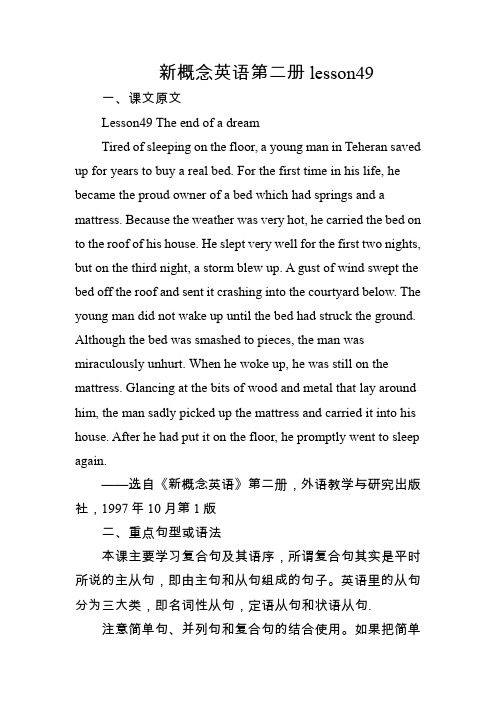
新概念英语第二册lesson49一、课文原文Lesson49 The end of a dreamTired of sleeping on the floor, a young man in Teheran saved up for years to buy a real bed. For the first time in his life, he became the proud owner of a bed which had springs and a mattress. Because the weather was very hot, he carried the bed on to the roof of his house. He slept very well for the first two nights, but on the third night, a storm blew up. A gust of wind swept the bed off the roof and sent it crashing into the courtyard below. The young man did not wake up until the bed had struck the ground. Although the bed was smashed to pieces, the man was miraculously unhurt. When he woke up, he was still on the mattress. Glancing at the bits of wood and metal that lay around him, the man sadly picked up the mattress and carried it into his house. After he had put it on the floor, he promptly went to sleep again.——选自《新概念英语》第二册,外语教学与研究出版社,1997年10月第1版二、重点句型或语法本课主要学习复合句及其语序,所谓复合句其实是平时所说的主从句,即由主句和从句组成的句子。
新概念英语第3册课文及翻译Lesson49~51

【导语】新概念英语⼀共144课。
整本书⽆论是语法还是词汇,题材还是语句,都有其出彩之处。
正是因为如此,新概念英语更是经久不衰,深受⼴⼤英语学习者的喜爱。
为您整理了“新概念英语第3册课⽂及翻译Lesson49~51”,希望可以帮助到您!新概念英语第3册课⽂及翻译Lesson49 【课⽂】 It is a good thing my aunt Harriet died years ago. If she were alive today she would not be able to air her views on her favourite topic of conversation: domestic servants. Aunt Harriet lived in that leisurely age when servants were employed to do housework. She had a huge, rambling country house called 'The Gables'. She was sentimentally attached to this house, for even though it was far too big for her needs, she persisted in living there long after her husband's death. Before she grew old, Aunt Harriet used to entertain lavishly. I often visited The Gables when I was a boy. No matter how many guests were present, the great house was always immaculate. The parquet floors shone like mirrors; highly polished silver was displayed in gleaming glass cabinets; even my uncle's huge collection of books was kept miraculously free from dust. Aunt Harriet presided over an invisible army of servants that continuously scrubbed, cleaned, and polished. She always referred to them as 'the shifting population', for they came and went with such frequency that I never even got a chance to learn their names. Though my aunt pursued what was, in those days, an enlightened policy, in that she never allowed her domestic staff to work more than eight hours a day, she was extremely difficult to please. While she always criticized the fickleness of human nature, she carried on an unrelenting search for the ideal servant to the end of her days, even after she had been sadly disillusioned by Bessie. Bessie worked for Aunt Harriet for three years. During that time she so gained my aunt's confidence that she was put in charge of the domestic staff. Aunt Harriet could not find words to praise Bessie's industriousness and efficiency. In addition to all her other qualifications, Bessie was an expert cook. She acted the role of the perfect servant for three years before Aunt Harriet discovered her 'little weakness'. After being absent from the Gables for a week, my aunt unexpectedly returned one afternoon with a party of guests and instructed Bessie to prepare dinner. No only was the meal well below the usual standard, but Bessie seemed unable to walk steadily. She bumped into the furniture and kept mumbling about the guests. When she came in with the last course -- a huge pudding -- she tripped on the carpet and the pudding went flying through the air, narrowly missed my aunt, and crashed on the dining table with considerable force. Though this caused great mirth among the guests, Aunt Harriet was horrified. She reluctantly came to the conclusion that Bessie was drunk. The guests had, of course, realized this from the moment Bessie opened the door for them and, long before the final catastrophe, had had a difficult time trying to conceal their amusement. The poor girl was dismissed instantly. After her departure, Aunt Harriet discovered that there were piles of empty wine bottles of all shapes and sizes neatly stacked in what had once been Bessie's wardrobe. They had mysteriously found their way there from the wine cellar! 【课⽂翻译】 我的姑妈哈丽特好多年前就去世了,这倒是件好事。
新概念英语第一册49课课文原文

新概念英语第一册49课课文原文Lesson 49 A noble gangsterOne of the most powerful gangsters in Chicago before the start of World War II was Al Capone. He was born in Italy in 1899. His father was a hairdresser and his mother was a seamstress. When Capone was 11 years old, he joined a street gang. At the age of 14, he became the leader of a small group of young criminals. Capone was sent to prison for the first time at the age of 15 for carrying a concealed weapon.After serving a few months in prison, Capone moved to Chicago and started working for Johnny Torrio, a well-known gangster at the time. Torrio taught Capone about the illegal activities that were taking place in Chicago, such as gambling, prostitution, and bootlegging. Capone quickly rose through the ranks and became one of Torrio's most trusted men. When Torrio retired, Capone took over as the leader of the gang.Under Capone's leadership, the gang became extremely powerful and influential. They controlled many illegal businesses in Chicago and made millions of dollars. Capone was known for his violent ways and his ability to eliminate anyone who crossed him. However, he also had a reputation for being generous towards the poor. During the Great Depression, Caponeopened up soup kitchens and distributed food to the needy. Many people in Chicago saw him as a modern-day Robin Hood.Capone's reign of terror eventually came to an end when he was convicted of tax evasion in 1931. He was sentenced to 11 years in prison and was released on parole in 1939 due to his deteriorating health. He spent his remaining years in Florida before dying in 1947.Al Capone's life is a fascinating example of how a criminal can simultaneously be seen as both ruthless and generous. Despite his illegal activities, he was admired by some for his charitable acts, especially during times of hardship. This paradoxical nature has made Capone a legendary figure in the history of organized crime.。
新概念英语第一册第49课

Lesson 49-At the Butcher's文本BUTCHER: Do you want any meat today.Mrs. Bird?MRS.BIRD:Yes, please.BUTCHER: Do you want beef or lamb?MRS.BIRD:Beef, please.BUTCHER:This lamb's very good.MRS.BIRD: I like lamb,but my husband doesn't. BUTCHER: What about some steak?This is a nice piece. MRS.BIRD:Give me that piece, please.MRS.BIRD: And a pound of mince, too.BUTCHER:Do you want a chicken,Mrs. Bird?They 're very nice.MRS.BIRD:No, thank you.MRS.BIRD: My husband likes steak,but he doesn't like chicken.BUTCHER:To tell you the truth,Mrs. Bird,I don't like chicken either!参考译文肉商:您今天要买点肉吗,伯德夫人?伯德夫人:是的,我买一点。
肉商:您要牛肉还是要羔羊肉?伯德夫人:请给我牛肉。
肉商:这羔羊肉很好。
伯德夫人:我喜欢羔羊肉,可我丈夫不喜欢。
肉商:来点牛排吗?这块很好。
伯德夫人:就请给我那块吧。
伯德夫人:再来一磅绞肉。
肉商:您要买只鸡吗,伯德夫人?这些鸡很好。
伯德夫人:不要了,谢谢。
伯德夫人:我丈夫喜欢牛排,但他不喜欢鸡。
肉商:说老实话,伯德夫人,我也不喜欢鸡。
生词和短语课文详解1. At the butcher's.【译文】在肉店。
新概念英语二lesson49

• Tired of sleeping on the floor, a young man in Teheran saved up for years to buy a real bed. • be tired of 对……感到厌倦,这里用形容词 短语直接做原因状语,相当于原因状语从句 as he was tired of… • be tired of doing sth. / sth. /sb. • save up 攒钱,储蓄 • to = in order to
New words and expressions • 7、sweep 1、tired • 8、courtyard 2、real • 9、smash 3、owner • 10、miraculously 4、spring • 11、unhurt 5、mattress • 12、glance 6、gust • 13、promptly
• sweep [swi:p] (sweep-swept-swept) v. 扫,打扫;席卷;扫视;袭击 • 1、 The room has been swept clean.、 • : sweep sth. away 把……刮走 :The newspaper has been swept away by the wind. • :blow (v.)吹
• :mat
•
n. 垫子 (如杯垫)
cushion n.
• gust [ɡʌst] n. 一阵狂风;风味;趣味 例如:a gust of wind • 一阵风
a gust of anger (一阵)无名火 n. 微风
• breeze
gale n. 大风突发的 一阵风(风力比gust强) • wind n. 风的总称
• miraculously [mi'rækjuləsli]:unexpectedly adv. 奇迹般地;神奇地;出乎 • :The fever had miraculously disappeared, and the coughing had stopped. • :miracle (n.)奇迹 • :There can be miracles when you believe. • 只要你相信就会有奇迹。 • miraculous (adj.)奇迹般的, 非常棒的
新概念英语第二册笔记-第49课
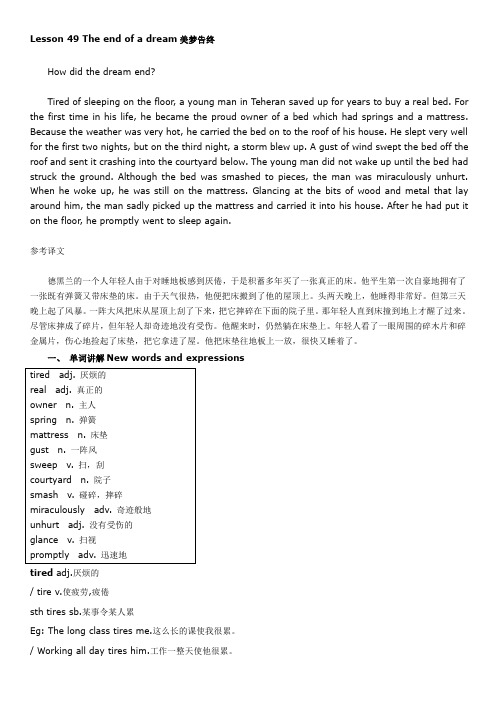
Lesson49The end of a dream美梦告终How did the dream end?Tired of sleeping on the floor,a young man in Teheran saved up for years to buy a real bed.For the first time in his life,he became the proud owner of a bed which had springs and a mattress. Because the weather was very hot,he carried the bed on to the roof of his house.He slept very well for the first two nights,but on the third night,a storm blew up.A gust of wind swept the bed off the roof and sent it crashing into the courtyard below.The young man did not wake up until the bed had struck the ground.Although the bed was smashed to pieces,the man was miraculously unhurt. When he woke up,he was still on the mattress.Glancing at the bits of wood and metal that lay around him,the man sadly picked up the mattress and carried it into his house.After he had put it on the floor,he promptly went to sleep again.参考译文德黑兰的一个人年轻人由于对睡地板感到厌倦,于是积蓄多年买了一张真正的床。
(完整版)新概念第一册第49-50课重点知识
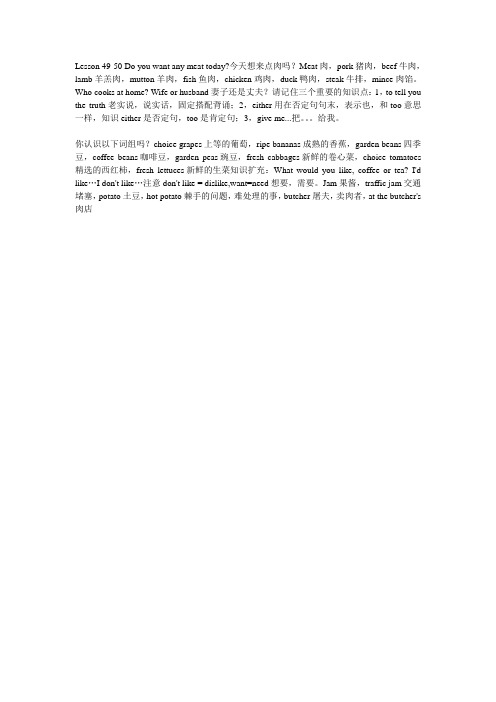
Lesson 49-50 Do you want any meat today?今天想来点肉吗?Meat肉,pork猪肉,beef牛肉,lamb羊羔肉,mutton羊肉,fish鱼肉,chicken鸡肉,duck鸭肉,steak牛排,mince肉馅。
Who cooks at home? Wife or husband妻子还是丈夫?请记住三个重要的知识点:1,to tell you the truth老实说,说实话,固定搭配背诵;2,either用在否定句句末,表示也,和too意思一样,知识either是否定句,too是肯定句;3,give me...把。
给我。
你认识以下词组吗?choice grapes上等的葡萄,ripe bananas成熟的香蕉,garden beans四季豆,coffee beans咖啡豆,garden peas豌豆,fresh cabbages新鲜的卷心菜,choice tomatoes 精选的西红柿,fresh lettuces新鲜的生菜知识扩充:What would you like, coffee or tea? I'd like…I don't like…注意don't like = dislike,want=need想要,需要。
Jam果酱,traffic jam交通堵塞,potato土豆,hot potato棘手的问题,难处理的事,butcher屠夫,卖肉者,at the butcher's 肉店。
新概念英语第一册课文49课文
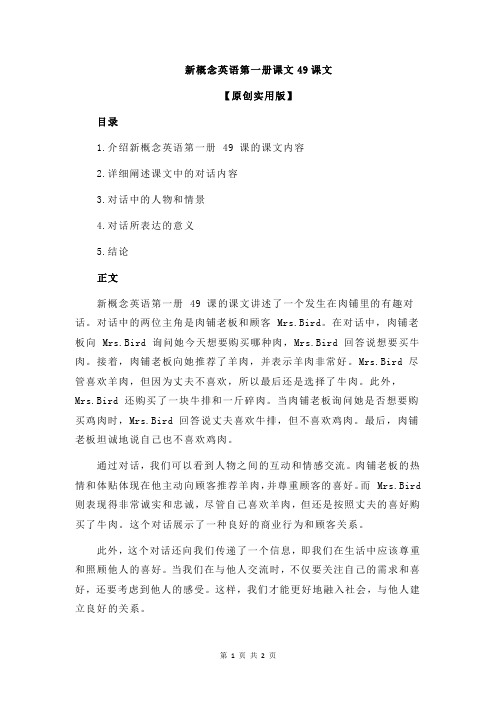
新概念英语第一册课文49课文
【原创实用版】
目录
1.介绍新概念英语第一册 49 课的课文内容
2.详细阐述课文中的对话内容
3.对话中的人物和情景
4.对话所表达的意义
5.结论
正文
新概念英语第一册 49 课的课文讲述了一个发生在肉铺里的有趣对话。
对话中的两位主角是肉铺老板和顾客 Mrs.Bird。
在对话中,肉铺老板向 Mrs.Bird 询问她今天想要购买哪种肉,Mrs.Bird 回答说想要买牛肉。
接着,肉铺老板向她推荐了羊肉,并表示羊肉非常好。
Mrs.Bird 尽管喜欢羊肉,但因为丈夫不喜欢,所以最后还是选择了牛肉。
此外,Mrs.Bird 还购买了一块牛排和一斤碎肉。
当肉铺老板询问她是否想要购买鸡肉时,Mrs.Bird 回答说丈夫喜欢牛排,但不喜欢鸡肉。
最后,肉铺老板坦诚地说自己也不喜欢鸡肉。
通过对话,我们可以看到人物之间的互动和情感交流。
肉铺老板的热情和体贴体现在他主动向顾客推荐羊肉,并尊重顾客的喜好。
而 Mrs.Bird 则表现得非常诚实和忠诚,尽管自己喜欢羊肉,但还是按照丈夫的喜好购买了牛肉。
这个对话展示了一种良好的商业行为和顾客关系。
此外,这个对话还向我们传递了一个信息,即我们在生活中应该尊重和照顾他人的喜好。
当我们在与他人交流时,不仅要关注自己的需求和喜好,还要考虑到他人的感受。
这样,我们才能更好地融入社会,与他人建立良好的关系。
综上所述,新概念英语第一册 49 课的课文通过一个简单的对话,向我们传递了尊重他人喜好的重要性。
新概念英语第一册第49-50课-At the butcher's

新概念英语第一册第49-50课:At the butcher'sLesson 49 At the butcher's在肉店Listen to the tape then answer this question. What does Mr. Bird like?听录音,然后回答问题。
伯德先生喜欢什么?BUTCHER: Do you want any meat today.Mrs. Bird?肉商:您今天要买点肉吗,伯德夫人?MRS.BIRD: Yes, please.伯德夫人:是的,我买一点。
BUTCHER: Do you want beef or lamb?肉商:您要牛肉还是要羔羊肉?MRS.BIRD: Beef, please.伯德夫人:请给我牛肉。
BUTCHER: This lamb's very good.肉商:这羔羊肉很好。
MRS.BIRD: I like lamb,but my husband doesn't.伯德夫人:我喜欢羔羊肉,可我丈夫不喜欢。
BUTCHER: What about some steak?This is a nice piece.肉商:来点牛排吗?这块很好。
MRS.BIRD: Give me that piece, please.伯德夫人:就请给我那块吧。
MRS.BIRD: And a pound of mince, too.伯德夫人:再来一磅绞肉。
BUTCHER: Do you want a chicken,Mrs. Bird?They 're very nice. 肉商:您要买只鸡吗,伯德夫人?这些鸡很好。
MRS.BIRD: No, thank you.伯德夫人:不要了,谢谢。
MRS.BIRD: My husband likes steak,but he doesn't like chicken. 伯德夫人:我丈夫喜欢牛排,但他不喜欢鸡。
新概念英语第一册第49-50课
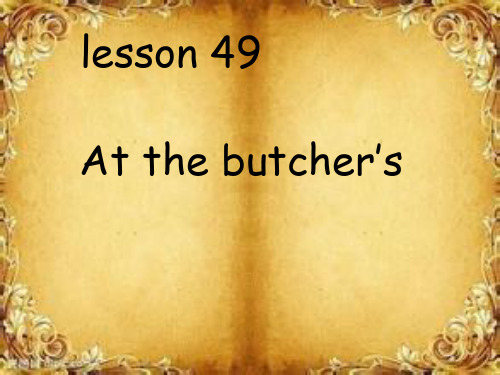
B Answer these questions using I, he or she. 模仿例句回答以下问题,选用I, he或she。 Examples: Does Penny like tomatoes? Yes, she does. She likes tomatoes, but she doesn't want any. Do you like potatoes? Yes, I do. I like potatoes, but I don't want any.
tell:tell sb. sth. 告诉某人某事 tell sth. to sb. 告诉某人某事 tell sb. about/of sth. 向某人讲起
Flash words
• • • • • • • Butcher [‘butʃә(r)] meat [mi:t] beef [bi:f] lamb [lӕm] steak [ steik] mince [mins] chicken [tʃikin]
Do you want a chiken, Mrs. Bird? They are very nice.
可数:(一整只) 鸡 不可数:鸡肉
No, thank you.
My husband likes steak, but hen.
说实话,老实告诉你
To tell you the truth, Mrs. Bird,
Do you like running man?
一般现在时
肯定结构 1.主语 + be +其它. 如:It is cold today. 2.主语 + 动词原形+其它 如:I want an apple. 3.主语 + 动词+s/es(第三人称单数作主语时) 如: She likes apples.
新概念英语第二册Lesson49~53课文注释
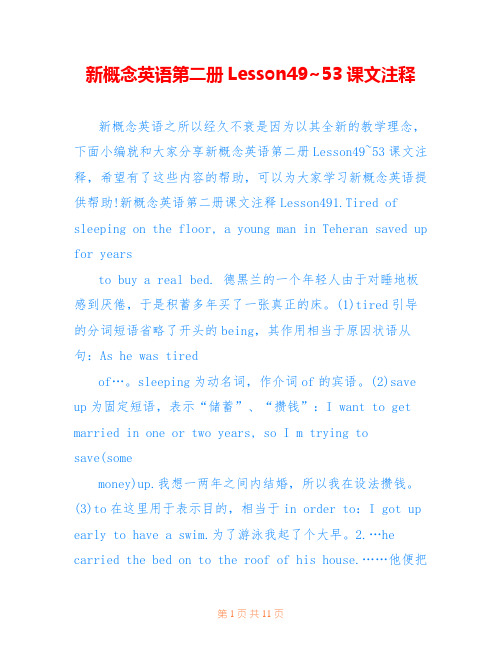
新概念英语第二册Lesson49~53课文注释新概念英语之所以经久不衰是因为以其全新的教学理念,下面小编就和大家分享新概念英语第二册Lesson49~53课文注释,希望有了这些内容的帮助,可以为大家学习新概念英语提供帮助!新概念英语第二册课文注释Lesson491.Tired of sleeping on the floor, a young man in Teheran saved up for yearsto buy a real bed. 德黑兰的一个年轻人由于对睡地板感到厌倦,于是积蓄多年买了一张真正的床。
(1)tired引导的分词短语省略了开头的being,其作用相当于原因状语从句:As he was tiredof…。
sleeping为动名词,作介词of的宾语。
(2)save up为固定短语,表示“储蓄”、“攒钱”:I want to get married in one or two years, so I m trying tosave(somemoney)up.我想一两年之间内结婚,所以我在设法攒钱。
(3)to在这里用于表示目的,相当于in order to:I got up early to have a swim.为了游泳我起了个大早。
2.…he carried the bed on to the roof of his house.……他便把床搬到了他的屋顶上。
介词onto可拼写成一个词,也可拼写成两个词(on to)。
它用于表示动作方向而不用于表示静态的位置(与into相似):I put the pen onto/ on the table.我把笔放到桌子上。
The pen is on the table.笔在桌子上。
(不可用onto/ on to)onto/ on to有时可用on代替,但表示位置的on不可用onto代替:Mr. Thompson jumped onto the stage.汤普森先生跳上了台上。
新概念英语第一册自学笔记精讲解析Lesson49~54
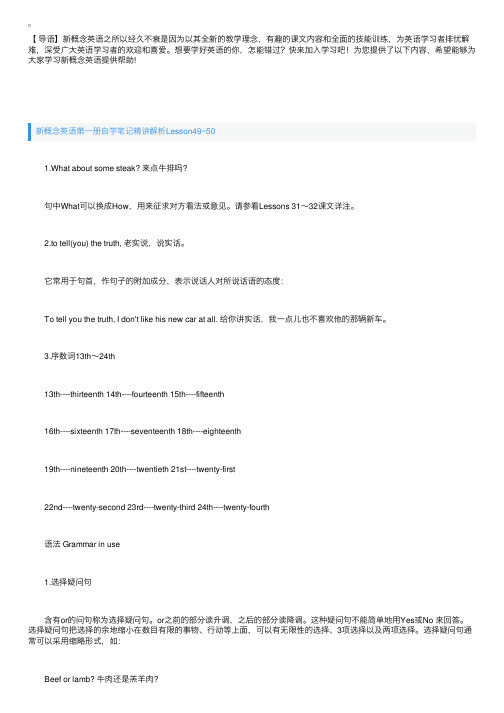
【导语】新概念英语之所以经久不衰是因为以其全新的教学理念,有趣的课⽂内容和全⾯的技能训练,为英语学习者排忧解难,深受⼴⼤英语学习者的欢迎和喜爱。
想要学好英语的你,怎能错过?快来加⼊学习吧!为您提供了以下内容,希望能够为⼤家学习新概念英语提供帮助!新概念英语第⼀册⾃学笔记精讲解析Lesson49~50 1.What about some steak? 来点⽜排吗? 句中What可以换成How,⽤来征求对⽅看法或意见。
请参看Lessons 31~32课⽂详注。
2.to tell(you) the truth, ⽼实说,说实话。
它常⽤于句⾸,作句⼦的附加成分,表⽰说话⼈对所说话语的态度: To tell you the truth, I don't like his new car at all. 给你讲实话,我⼀点⼉也不喜欢他的那辆新车。
3.序数词13th~24th 13th----thirteenth 14th----fourteenth 15th----fifteenth 16th----sixteenth 17th----seventeenth 18th----eighteenth 19th----nineteenth 20th----twentieth 21st----twenty-first 22nd----twenty-second 23rd----twenty-third 24th----twenty-fourth 语法 Grammar in use 1.选择疑问句 含有or的问句称为选择疑问句。
or之前的部分读升调,之后的部分读降调。
这种疑问句不能简单地⽤Yes或No 来回答。
选择疑问句把选择的余地缩⼩在数⽬有限的事物、⾏动等上⾯,可以有⽆限性的选择、3项选择以及两项选择。
选择疑问句通常可以采⽤缩略形式,如: Beef or lamb? ⽜⾁还是羔⽺⾁? 选择疑问句的例句如: What would you like to drink? 你喜欢喝什么?(⽆限性选择) Which/What would you prefer, tea or coffee? 茶和咖啡,你喜欢哪⼀种?(两项选择) Would you like tea, coffee, or milk? 你喜欢茶、咖啡、还是⽜奶?(3项选择) How shall we go, by bus or by train? 我们怎么⾛?乘公共汽车还是坐⽕车? Did you go there, or didn't you? 你去了那⼉还是没有去? Did you or didn't you go there? 你是去了还是没有去那⼉? 2.⼀般现在时的单数第3⼈称形式 (可参见 Lessons 47~48语法部分。
新概念英语第二册lesson_49新

★sweep (swept[swept],swept) ① vt. 扫,打扫 ② vt. (风)吹;刮 The typhoon in Japan swept away many houses.
★courtyard n. 院子 court n. 院子,庭院;法庭 + yard n. 院子 backyard n.
bits and pieces
NEW CONCEPT ENGLISH
Lesson 49 The end of a dream
★tired adj. 厌烦的 be/get tired of sth./doing sth. 讨厌做某事
★real adj. 真正的
true adj. 真挚, 真诚, 符合标准
real man
true man
★owner n. 物主,所有者,主人 the owner of the private cars the owner of the house
★spring n. 弹簧 n. 春天;泉水
★mattress n. 床垫
★gust一阵(阵)风 a gust of anger breeze n. wind n.
be tired of sth./doing sth. 厌倦做某事
Because the weather was very hot, he carried the bed on to the roof of his house. on to = onto
eg. The cat jumped on to the chair. 那猫跳到椅子上了。
Glancing at the bits of wood and metal that lay around him, the man sadly picked up the mattress and carried it into his house.
- 1、下载文档前请自行甄别文档内容的完整性,平台不提供额外的编辑、内容补充、找答案等附加服务。
- 2、"仅部分预览"的文档,不可在线预览部分如存在完整性等问题,可反馈申请退款(可完整预览的文档不适用该条件!)。
- 3、如文档侵犯您的权益,请联系客服反馈,我们会尽快为您处理(人工客服工作时间:9:00-18:30)。
新概念英语(Lesson49—56)姓名
★★★I.. 从A、B、C、D中选出划线部分的读音与其他三个不同的选项。
( ) 1. A. tell B. grape C. lettuce D. wet
( ) 2. A. meat B. peach C. bean D .steak
( ) 3. A. potato B. what C.make
( ) 4. A. together B. either C.truth D.weather
( ) 5 .A. clock B. moment C. home D. tomato
( ) 6. A. husband B. summer C. lettuce D subject
( ) 7 A. mild B. night C. arrive D .live
( ) 8. A. flower B. snow C. how D. brown
( ) 9 A. spring B. season C. rise D. pleasant
( ) 10. A. pear B. chair C. early D. hair
★★★II.根据汉语意思写出英语单词。
1 n.牛肉 2. n.牛排 3 v.告诉 4. n.实情
5 n.羔羊肉 6.n.桃7 adj.温暖的8. n.11月
9 n.话题10 n.谈话
★★★III.填入下列单词所缺的字母。
1.l nch 午餐 2 su lly通常 3. arr v 到达 4.s th南方 5.s son季节6. tumn秋天7.c ntry国家8.cl m te气候9.r n下雨10. v n ng晚上IV.填空以完成对话
1.Do want any meat today? , please. ★
2.Penny like tomatoes? No, she . ★
3.do you come from? I come from Greece. ★
4.What’s like in summer? It’s always hot in , July and august. ★
5.Is it or warm in autumn? Sometimes sometimes warm. ★
6.What’s the like in your country? is mild. ★
7.Which do you like best? like spring and summer. ★
8.What the mother do at noon? She always her lunch at noon.
9.What the children do in the morning? They to school in the morning.
10.their father take them to school ? Yes, he .
★★★V.完成句子,用括号中动词的正确形式填空。
1.She is (read) English in the classroom.
2.I’m going to (wash) the dishes.
3.He usually (get up) early.
4.Sawyer can’t (go to) school today..
5.The dog is (run) in the garden.
6.I come from China, but she (come) from Italy.
7.Hans and his wife are (walk) along the banks of the river..
8.Sally is going to (type) the letter.
9.Mr. Sawyer always (arrive) home late.
10.The sun (rise) early and sets late..
★★★VI.从括号中选出恰当的填入九子中。
1. I’m going to (turn, turning) off the lights.
2. She can’t (get, gets) up early every day.
3. Penny are (climbing, climb) the tree.
4. The cat can (drink, drinks) its milk.
5. Tim (come, comes) from Greece.
6. It’s (rain, raining) sometimes in November.
7. It often (snows, snow) in February.
8. He (like, likes) meat and I like bean.
9. They are (working, works) hard.
10. Does Elizabeth (like, likes) pears?
★★★VII.完成句子,将括号中的汉语译成英语。
1.My husband (不喜欢鸡肉).
2.My daughter (喜欢牛肉).
3. (天总是很冷)in November.
4.It’s always warm (在四、五月份).
5. Mrs. White likes peas, but she (不喜欢豆角).
6.Sally (来自巴西).
7.What is his (国籍)?
8.Which season (你最喜欢)?
9.It’ s our (最喜欢谈论的话题)
10.Mr. Sawyer (有时看电视)
VIII.把下列句子按正确的顺序重新排列。
A.She does the housework.
B.S ince the children go to school, he often takes them to school every day.
C.I n the evening, the children come home from school.
D.The Turners live at 103 Queen Street.
E.She always eats her lunch at noon.
F.Mr. Turner comes home from work. He arrives home late.
G.In the morning Mr. Turner goes to work.
H.They arrive home early.
I.Mrs. Turner stays at home every day.
J.In the afternoon , she usually sees her friends.。
